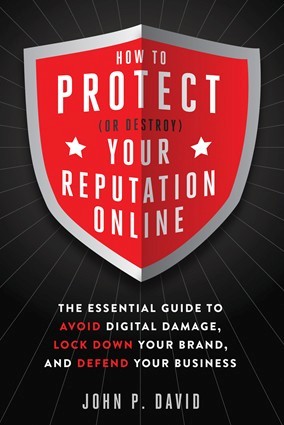Three Keys to a Good Online Reputation
Headlines today are filled with cell phone videos of bad behavior, verbal attacks in the twitter-verse, and disturbing incidents of cyberbullying. In our everyday lives, disgruntled customers or employees tarnish reputations of local businesses or past employers and jobs are lost or never offered because of inappropriate social media sharing. Business owners who want to have better control of their reputation online should follow these three key pieces of advice:

Build your online firewall. If your business could be hijacked by negative reviews and online attacks, then you need to ensure that you regularly publish your positive news and build a legacy of positive internet results. It’s tougher for negative information to take center stage in the future if there’s already a lot of positive information anchoring top search results.
Stake your claim to your name. This is really basic stuff but it merits repeating. In a crisis, it is important for your customers and the public to be able to hear your news as directly as possible from the source. Your company should have a Twitter account, a Facebook page, and a LinkedIn page if for no other reason than it verifies your company’s identity and authenticates your news.
Address negative info. If there’s negative information about your company posted online, you have to react in some way. Review sites generally enable companies to respond to comments, both positive and negative. Take advantage of this option. Damaging content can be removed in some cases, but simply allowing negative information to remain unchecked is typically not a good strategy.
2. Get a handle on online review sites
Review sites like Yelp, TripAdvisor, Angie’s List and Glassdoor are growing in both popularity and authority with search engines. The more companies participate on the sites, the bigger the sites become and authority grows. The impact is building. As one review site executive said to me: “The genie is out of the bottle.” Review sites are here, they are dominating search results, and they can’t be ignored.
Claim or create your company page on the main review sites. Your company may not yet have a listing on a site like Yelp, but any customer or interested party could create one without your knowledge and certainly without your consent. Business owners should look at the main review sites and either claim their page if one has already been created or create their own listing – this will give you a small level of control.
Build out your review site listings. Across the board, executives from review sites recommend completing profiles and adding information to business listings. Up-to-date photos, videos and descriptions increase page views as well as interest from prospective customers or employees. Plain listings without images look stale as customers on review sites are typically interested in getting current information.
Engagement. Likely the biggest trend in online reviews centers on engagement. Interaction between businesses and their customers helps build the overall sense of community, and executives from review sites universally advocate for responding to both positive and negative reviews.
Don’t try to fix “crazy.” When speaking with one executive who has had tremendous success with Yelp, he mentioned that they have some very simple rules. His company will bend over backwards for his customers, but “we don’t do crazy.” Sometimes customers have outrageous expectations, and every business owner has dealt with clients who may not be “all there in the head.”
3. In case of emergency, know your options
When confronted with negative online content that hinders your business or damages your reputation, the best advice is to remain calm and make a sound assessment. While the first reaction may be to blast away at the hate blog, defamatory post, negative news article, or nasty review, we have found that it makes more sense to slow down and develop a strategy before confronting the source.
Negotiate removal. Most websites are run by legitimate businesses that have no interest in publishing false, tasteless or potentially defamatory content. Of course, some sites are run by neurotic bloggers, but the vast majority have sensible human beings at the controls. If you are dealing with negative web postings or negative articles posted on a corporate site or corporate message board, it may be possible to negotiate removal.
Suppress, push-down or bury. When you research online reputation management companies, you quickly learn that they offer a distinct service known in the industry as “suppression.” They will create new, benign web content with the hopes of pushing down or suppressing negative search results. This tactic can be very effective, but it isn’t always the best solution, or the most economical
The idea is that you flood the Internet with positive content about you or your company and work to push down, bury, or “suppress,” the negative content. Information is not removed from search results but rather pushed farther down the search result pages to a point where fewer people will see it.
Remove it using the Covert Ops of reputation management. One of the Internet’s big secrets is that digital is not necessarily forever. The common belief is that once something is posted online, it will stay there forever. Many people endure a feeling of helplessness at this thought, but options exist. Content can actually be removed from search results and sometimes entirely from cyberspace. There are folks who can make things disappear from search results. It’s a fairly exclusive thing and exactly how it works I can’t explain, but we have been able to get stories and posts completely removed from search results These tactics are not the same thing as suppression, which pushes negative information further down the search results. I’m talking about either removing or hiding negative content.
More information about protecting your online reputation is available in How to Protect (Or Destroy) Your Reputation Online (Career Press, October 2016).
About the Author













Leave a Reply
Want to join the discussion?Feel free to contribute!